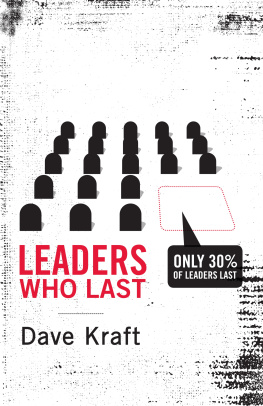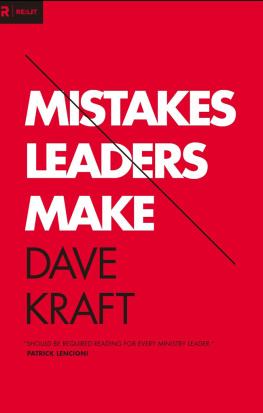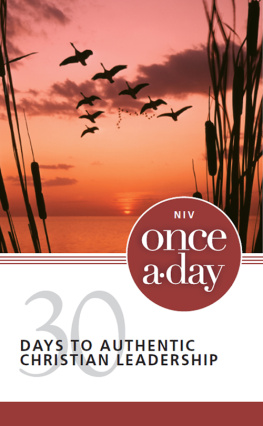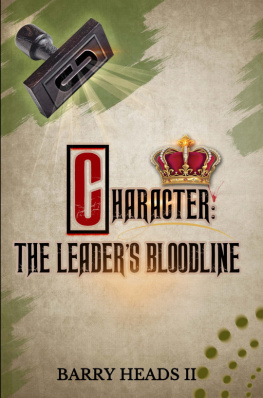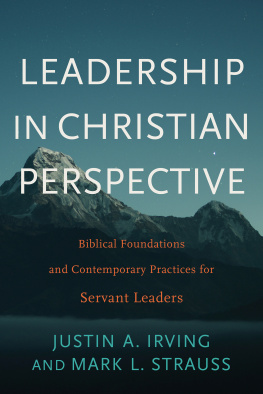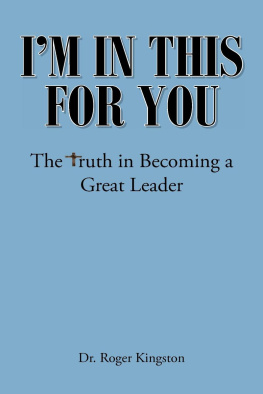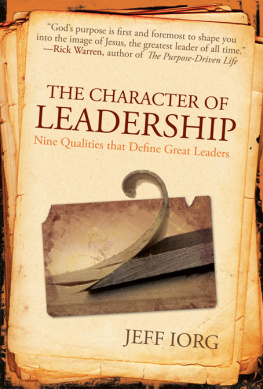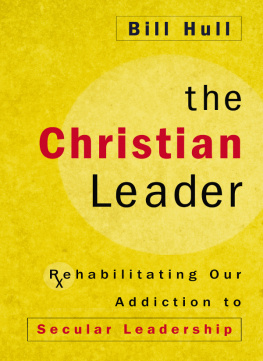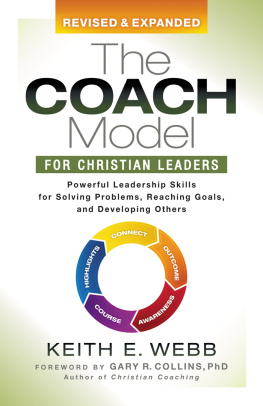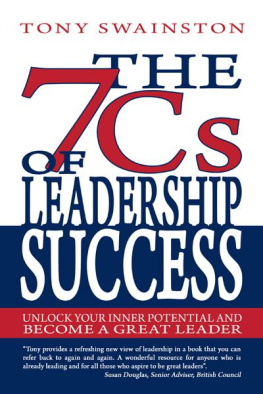Thank you for downloading this Crossway book.
Sign-up for the Crossway Newsletter for updates on special offers, new resources, and exciting global ministry initiatives:
Crossway Newsletter
Or, if you prefer, we would love to connect with you online:
Facebook
Twitter
Google +
I have been the recipient of lots of help. The following individuals gave me ideas: Keith McGuire, Cheryl Meredith, Pete Pagan, Erick Goss, Pete Gerhard, Ron Bennett, and Adam Holtz. Louie Platt devoted many hours to proofreading and making needed corrections. Lastly, I want to thank author and church consultant Bill Easum, who first planted the seed in my heart to write a book on leadership.
Remember that the power comes through you,
not from you.
FRED SMITH SR.

As a leader, everything I am and everything I do needs to be anchored in my identity with Christ. Leadership begins and ends with a clear understanding of the gospel and being rooted in the grace of Jesus Christ as a free gift.
Gospel Identity
I am saved and kept by the power of God and am a Christian and a leader by grace and grace alone. I didnt earn it and I dont deserve it. Ephesians 2:89 says it well: For by grace you have been saved through faith. And this is not your own doing; it is the gift of God, not a result of works, so that no one may boast. As I lead, I lead out of the reality of being saved by Jesus, and Jesus alone, and empowered by the Holy Spirit for the leadership role and responsibilities to which he calls me. It is too easy for the work and the ministry to be the center instead of Jesus himself.
I had a rude awakening a few years ago. I was asked to speak to a group of pastors at a retreat on the subject of the pastors personal devotional life. As we launched into the first day, I was shocked to find out that most of the pastors only spent time with the Lord in his Word when preparing for preaching and teaching. I thought this was highly unusual, since I was taught early how important it is to feed myself from Scripture before seeking to give spiritual sustenance to others. Ezra 7:10 has long been my benchmark: For Ezra had set his heart to study the Law of the LORD, and to do it and to teach his statutes and rules in Israel. First,
I study and apply Gods Word to my life. Then I teach others.
Since that retreat, I have discovered that many leaders have never established spiritual habits of the heart that include confession and worship, as well as intake of the Word of God. This is vital to staying connected with Jesus, the power source of our life and ministry.
In order to achieve balance in my life as a Christian leader (and yes, I believe it is possible), I start with Jesus Christ in the center. Jesus Christ is my power. I desire to tap into his infinite energy daily and consistently and to not rely on my own finite power supply.
Spiritual Disciplines
I realize that different leaders use different methods and tools to help them accomplish that balance and to stay fresh and vibrant in their walk with God. In many cases, this is accomplished through Christian disciplines.
Some of these disciplines are:
The study of Scripture
Spending time in prayer and worship
Taking time for extended periods of solitude, meditation, and fasting
These disciplines create a state of mind that is receptive to the grace of God that keeps us fresh in our personal relationship with the Lord Jesus Christ.
My Christian life began by experiencing Jesus as my Savior from the penalty of sin, and embracing his death on the cross for myself. I responded to his gracious invitation to come to him. At twenty years of age, I acknowledged that I had sinned, repented of my sin, and accepted Jesus offer to be part of his family. From that point on I have gradually learned how to walk with him and stay in close contact with him through the practice of some well-tested disciplines (or holy habits of the heart).
Motorboats, Sailboats, and Rafts
The following thoughts from John Ortberg are insightful:
One of the analogies thats been kind of helpful to me is the difference between a motorboat, a raft, and a sailboat. In a motorboat, Im in charge. I determine how fast were going to go, and in what direction. Some people approach spiritual disciplines that way. If Im just aggressive enough, if I have enough quiet times, I can make transformation happen on my own.
Some people have been burned by that kind of approach, so they go to the opposite extreme and will say, Im into grace. Its like theyre floating on a raft. If you ask them to do anything to further their growth, theyll say, Hey, no. Im not into works. Im into grace. Youre getting legalistic with me. So they drift. There are way too many commands in Scripture for anybody to think that were called to be passive.
On a sailboat, however, I dont move if its not for the wind. I cant control the wind. I dont manufacture the wind. Jesus
It is vitally important that each of us discovers his own pathway to deep intimacy with the Lord Jesus Christ. For some, the way is music. For others, it is through thinking and reflection. Others find intimacy by observing and enjoying Gods creation, and still others when they experience authentic community. I try to use a combination of things, such as prayer walks, personal retreats, a daily devotional time, worshipful music, genuine community, or accountability with close and honest friends.
My Spiritual Disciplines
Allow me to specifically share some of my holy habits of the heart with you. These practices consistently tap into the power of Jesus to sustain me and flow through my life as a leader. Take these and adapt them in such a way that they nourish you and stretch your soul.
When I awake in the morning, I roll out of bed, fall on my knees, and silently (in my spirit and as a prayer) run through a little song: Fill me, fill me, fill me through and through. Fill me, fill me. Make me more like you. Fill me up, O Lord, today. Have your will, and have your way.
It is my deepest desire to put God in the drivers seat in my first waking moments; not my agenda but his, not my energy but his, not my will but his. I desperately want thatand need thatif I am going to experience the joy of the Lord.
I then go downstairs to spend time in Scripture reading, study, meditation, and prayer. I am very thankful that when I first became a believer, a few people encouraged me to spend daily time with the Lord by reading Scripture and praying.
My time through the years has varied, changed, and grown, but two ingredients have remained the same: I read and absorb Gods Word, and then I pray, seeking to respond to what he has shown me from the Word. I confess, thank, praise, pray for others, and share my heart, my fears, my desires, and my frustrations with the blessed and only Sovereign (1 Tim. 6:15).
In my Bible reading, I practice the Four Rs:
1. Read. Reading and marking the words and verses that speak to me.
2. Reflect. Thinking about what I have marked.
3. Respond. Focusing on truths I marked to pray about and obey.
4. Record. Capturing what God has said in writing (a journal).
The Four Rs set the stage for God to whisper in my ear, tell me he loves me, guide me in important issues and decisions, and confront sin in its various and often subtle manifestations. I still see that my heart is deceitful and desperately sick (Jer. 17:9), and I am an expert at rationalizing and trying to kid myself into believing that my sin is not sin.

